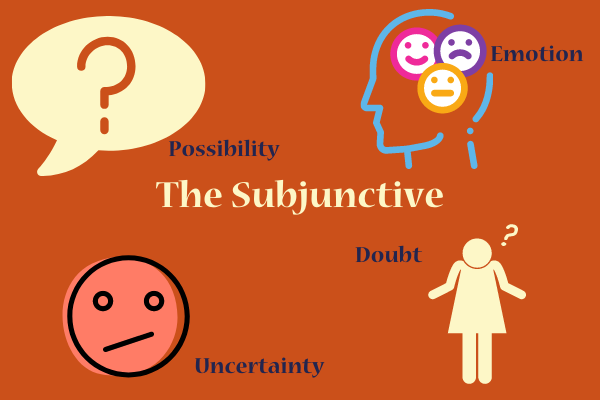The Spanish Subjunctive 101
¡Que tenga un buen día!
In Spanish, much like in other romance languages such as French and Italian, there exists a subjunctive tense. English does have subjunctive, but the verbs don't change so we as English speakers don't even know what it is or when we are using it. Because of this, learning the subjunctive is one of the most difficult parts of Spanish to master.
The subjunctive is a verb tense that expresses emotion, doubt, possibility, or uncertainty. We can use it to express desires, mutual feelings, hopes, goodbyes, or requests:
(Yo) quiero que (tú) vengas a vivir todos los días conmigo. I want you to move in with me.
Espero que (tú) tengas un excelente día. I hope you have an excellent day.
Ojalá que (él) pueda venir a mi fiesta en la noche. Hopefully he’ll be able come to my party.
¡Que tengas un bonito día! Have a nice day!
Similar to the indicative tense, the subjunctive tense has its own conjugation .
The basic conjugation is as follows:
Irregular verbs also have a different conjugation*:
*Remember, the root of irregular verbs change in the subjunctive tense, so it’s always good to make sure we’re using the correct form.
When to use the Subjunctive
We can use the subjunctive to express different things--desires, doubts, requests, feelings--but in any of these cases, there are two common sentence structures: simple sentences or subordinate clauses.
In simple sentences, it’s common to use the subjunctive mood after specific “trigger” words such as:
ojalá
quizás
tal vez
a lo mejor
posiblemente
Ojalá que vengas pronto a casa. Hopefully you’ll come home soon.
Tal vez vaya temprano a verte. Maybe I’ll go early to see you.
A lo mejor puedas invitarme cenar. Perhaps you can buy me dinner.
Posiblemente compre un pastel. I’ll possibly buy a cake.
¡Que tengas un buen día en el trabajo! Have a great day at work!
These phrases are usually expressions used to express our own wishes or to talk about possible ideas or the weather.
In subordinate clauses, we use the subjunctive to express emotions, requests, hopes, and more complex opinions toward a person or situation.
Some phrases for using the subjunctive in subordinate sentences are:
esperar que
desear que
querer que
pedir que
prohibir que
necesitar que
Espero que (tú) vengas pronto a la casa. I hope you’ll come home soon.
Deseo que (él) no toma mucho alcohol. I wish he wouldn’t drink so much.
Quiero que (ustedes) vayan a la tienda. I want you all to go to the store.
Necesito que (tú) me digas la verdad. I need you to tell me the truth.
Te pido que (tú) me escuches. I ask that you hear me out.
In these forms, we express our will toward another person or thing. We also use these forms to make a request or give a more direct order.
¡A practicar!
Now, practice with the following sentences filling in the blanks and deciding if the sentences express a wish, order, or request.
a. Espero que (tener, tú) ........................ suerte en el examen de mañana.
b. Ojalá que (encontrar, yo) ............................. trabajo este año.
c. Deseo que (decir, él) .......................... toda la verdad a ella.
d. ¡Que (tener,tú) ............................. un buen día!
e. Quiero que (venir,tú) ........................... a la fiesta de fin de curso.
f. Necesito que (comprar, ella) ........................ más papel para la impresora.
g. Quiero que (vender, nosotros) ....................... el coche, solo tiene problemas.
————
In our next lesson, we’ll learn more about situations where the subjunctive mood can help us more effectively communicate orders, doubts, or a future situation.
Want to dive more deeply into the subjunctive and master more Spanish? Sign up for our incredible online classes or come to immerse yourself here in Carrillo Puerto!






